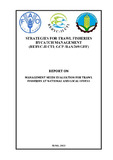| dc.description | The Coral Triangle region of Southeast Asia is one of the world’s most biologically diverse, economically productive and potentially vulnerable marine zones. As a result of increasing populations and exploitation pressures, growing threats from pollution and major ecosystem change are
a particular concern in the region. Also – as more widely in the global context – the non‐targeted capture of fish and non‐fish species, commonly called as bycatch and discards, is an increasing concern. Bycatch includes fish, turtles, corals and other seabed fauna and flora. This part of the catch tends to be poorly monitored and not managed but could have an important impact on fishery resources, habitats and ecosystems. In some fisheries and regions, there is an increasing trend towards retention of the bycatch consisting of juveniles and small‐sized fish for use as food for human consumption or for utilization as aquafeed. This is therefore a complex issue, requiring resource and biodiversity aspects to be tackled alongside human needs and involving a mix of policy, technical and community support measures. The project “Strategies for trawl fisheries bycatch management” (REBYC‐II CTI) was conceived based on the successes of the 2002‐2008 FAO/UNEP/GEF global project “Reduction of Environmental Impact from Tropical Shrimp Trawling through the Introduction of Bycatch Reduction Technologies and Change of
Management”. The REBYC‐II CTI project intends to focus on multispecies bottom trawling, where bycatch issues are amongst the most serious, with
potentially significant effects on ecosystems and livelihoods. The Project aims to address these challenges by promoting sustainable fishing practices
and improved trawl management. The REBYC‐II CTI project was developed
under the leadership of FAO (project implementing agency) in close collaboration with its partners: Southeast Asian Fisheries Development Center (SEAFDEC) and the governments of the participating countries Indonesia, Papua New Guinea, Philippines, Thailand and Viet Nam. Currently, even the total catch is not clearly known for the trawl fisheries in
Vietnam in general and if the total catches is known but only with uncertainty and there is no bycatch information in term of volume and species composition. There is an almost total lack of any operational‐level data on the catches and bycatch for all regions, such that trends in catch rate are unable to be monitored. Although national legal framework has been established to implement a logbook program requiring cooperation of fishing communities, implementation is very weak due to lack of compliance and enforcement. The difficulty of the catch monitoring task is exacerbated by the complex multi‐gear nature of the trawl fishery. Vietnam’s existing laws, policies, and institutional arrangements for trawl fisheries management and bycatch issues may not be sufficient to meet international/regional requirements such as those of the Code of Conduct for Responsible Fisheries (CCRF). To enhance Vietnam’s capacity, its legal
arrangements need to be reviewed for possible reform, if necessary, in order to comply with international and regional requirements, especially those approved by FAO on trawl fisheries management and bycatch reduction. Policy and institutional reform may also be necessary in Vietnam to enable its fisheries management administrations to be strengthened, recognition of national responsibility towards international and regional requirements in relation to bycatch issues improved and stakeholders’ participation in trawl fisheries management activities enhanced. To evaluate the management needs in trawl fisheries and the strategies for their management, a desk study was performed to gather trawl information at national level (central fisheries management authorities). In addition, two field trips were also carried out to collect information from various actors including local level such as fisheries administration, related agencies, fishing communities. The first field trip was conducted from 8‐11 April 2013 (Annex 3) and second one of from 25‐28 December 2013 (Annex 4, 5 and 6) at Kien Giang province. This report is to provide summaries on findings on data collection from the desk study and outcomes of the field trip to evaluate trawl fisheries management needs at national and local level and suggest suitable reforms on trawl fisheries management. | en |

